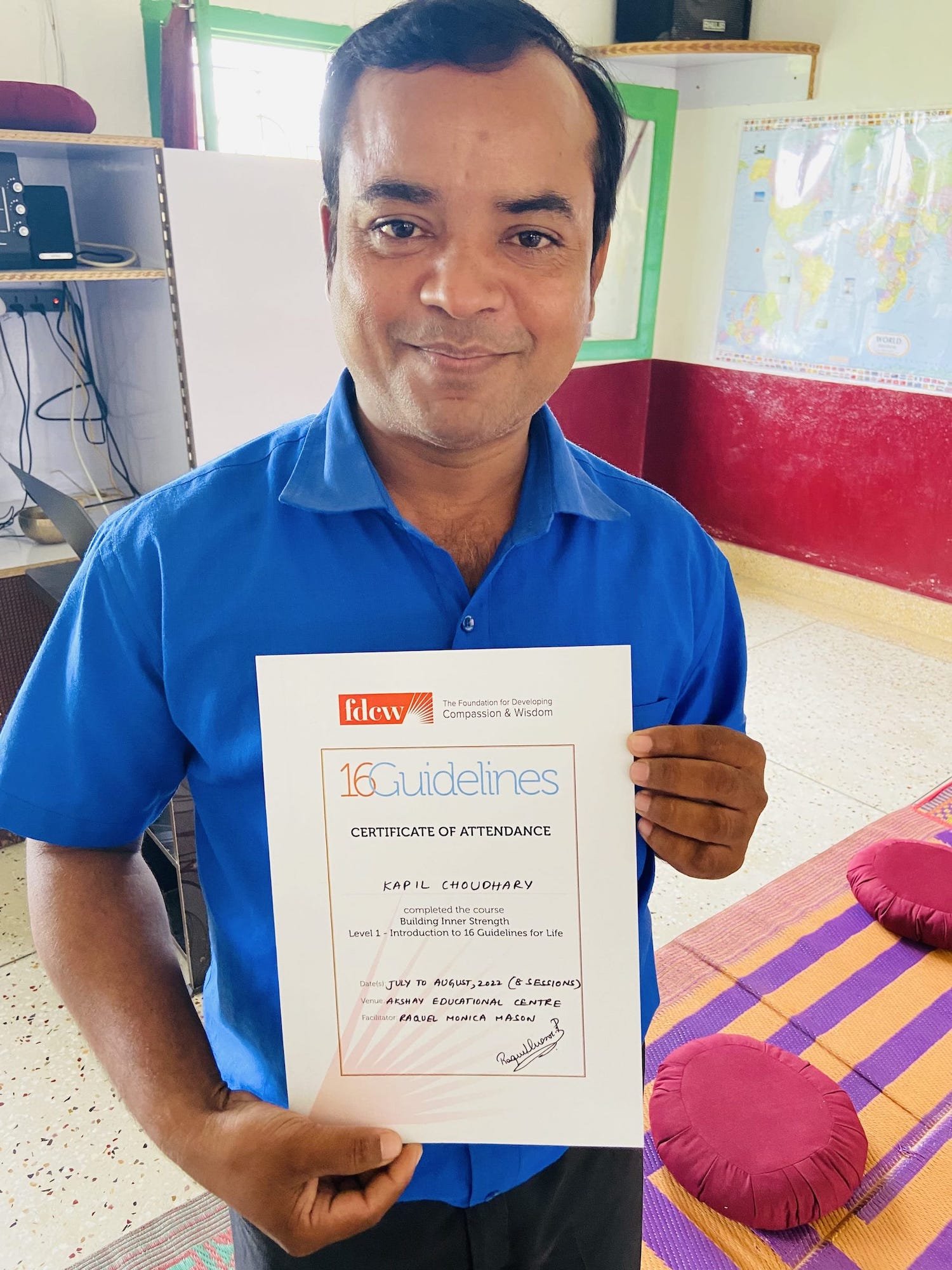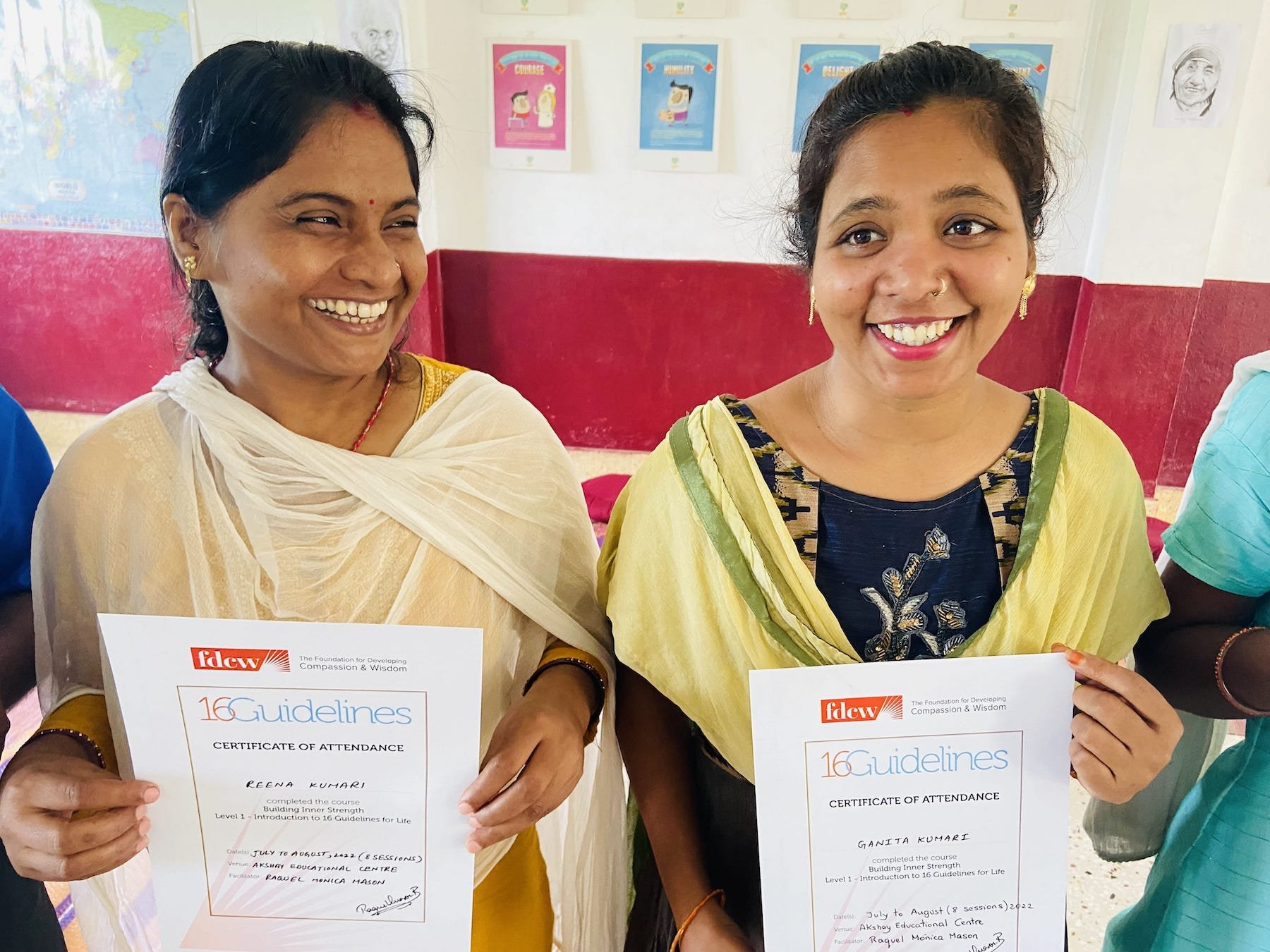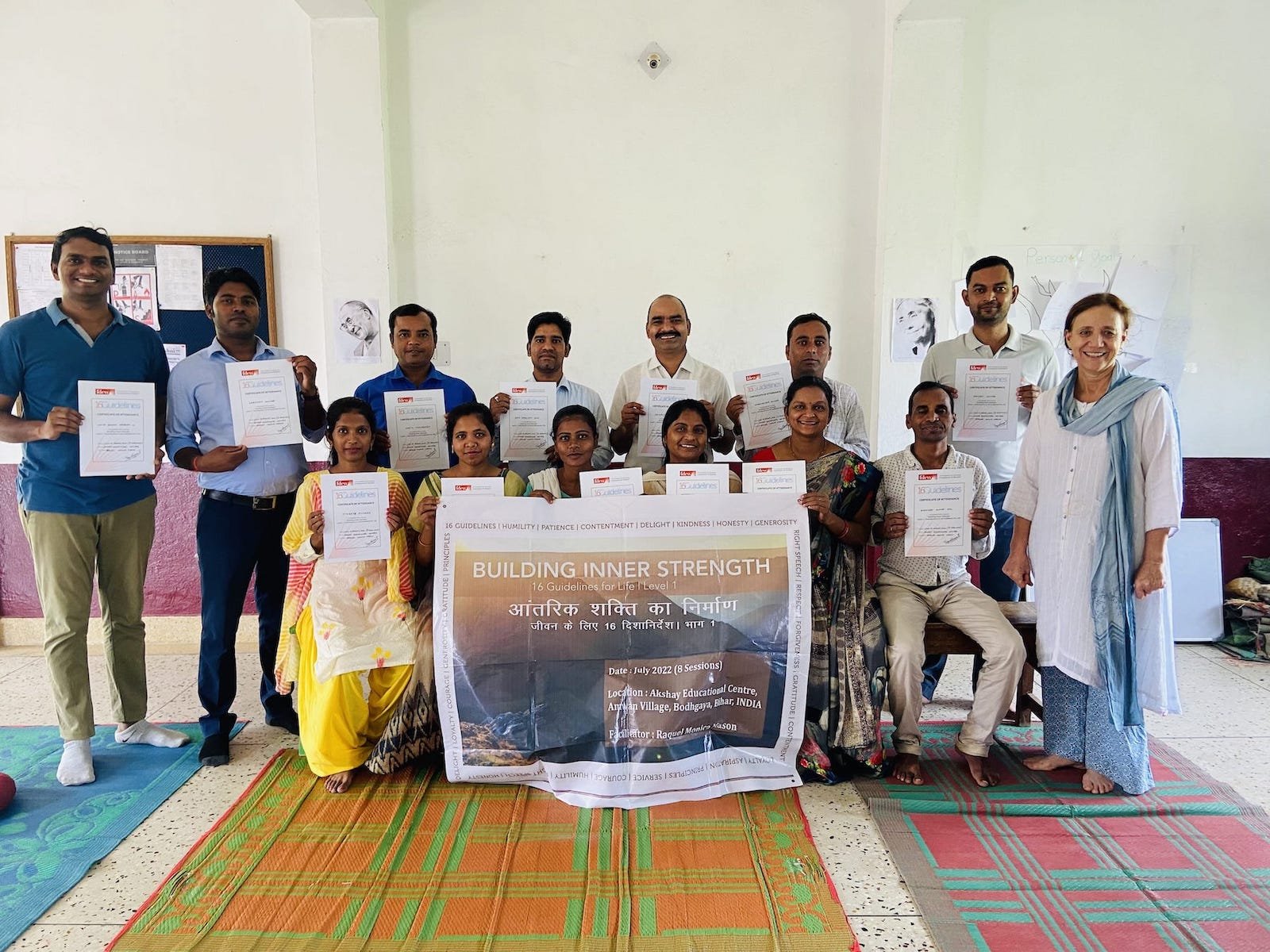16 Guidelines in Akshay School
16 Guidelines in Akshay School
Raquel Mason, the Director of Akshay School in Bodhgaya (India), has been incorporating the 16 Guidelines into the school’s curriculum since she completed a 16 Guidelines Level 1 course taught by facilitator Wendy Ridley in 2013. Earlier this year, Raquel went on to complete the 16 Guidelines Facilitator training with FDCW. As a result, she felt inspired to translate the 16G book into Hindi (which will be available soon) and train the teachers in her school in the 16 Guidelines.
Raquel explains below how, since 2013, the 16 Guidelines have been incorporated into daily life at Akshay and the benefits to both students and teachers:
“Akshay School in the village of Amwan, Bodhgaya (India) has been open since 2008. We currently have 245 boys and girls, 98% of which belong to the most socially and economically depressed and marginalized community in India known as the Dalits or “Untouchables”.
I got to know Universal Education and then the 16 Guidelines after a level 1 course taught by Wendy Ridley as facilitator in 2013. The teachers had the opportunity to carry out a training course also with Kabir Saxena in Maitreya School. Since 2013, we have incorporated the 16G into our curriculum and have been working on it with teachers and students with the help of the books published by the FDWC and other information collected on the internet.
“Every month we choose one of the 16G and work on it”
Every month we choose one of the 16G and work on it. We do a study group with the teachers once a month in which we discuss different aspects of the chosen Guideline and how it can better be applied by the students.
“Every morning…we establish our motivation related to the Guideline of the month…”
Every morning we start in school with the Assembly. All the students and teachers meditate and then we establish our motivation related to the chosen Guideline for that month. Some children share with everyone some positive experience where they have had the opportunity to practice the Guideline or in which somebody has practiced it with them. After Assembly, each class has 45 minutes of UE (Universal Education) daily where their teacher explores more deeply the meaning of the Guideline, through stories, biographies, videos, writing stories related to the Guideline by the children, preparing a small role play to later share in the Assembly, and talking about different experiences of the children with the Guideline.
“After lunch, 5 minutes of meditation is performed remembering the Guideline…”
After lunch, 5 minutes of meditation is performed remembering the Guideline and to keep awareness.Teachers try to always keep the Guideline in mind throughout the day at school, such as the practice of “Patience” when queuing, “Generosity” when sharing, “Kindness” helping a classmate, “Respect” for the teacher and other classmates, etc.
“At the end of school, 5 minutes of dedication.... and remember the Guideline again…”
At the end of the school day, 5 minutes of dedication is held, closing the school day and remembering the Guideline again so that the children continue practicing at home if possible.
“Practising 16 Guidelines is proving to be very positive for students as well as teachers and employees”
Practising 16 Guidelines is proving to be very positive for students as well as teachers and employees. The students live in an environment of a lot of violence, cheating, alcohol consumption pushed by poverty casteism and unemployment, so I think that what they can learn from the 16G and being the future leaders of their community, will help them live together in a more peaceful environment, with respect and better relationships with each other.
“The important thing to teach in the school is that the children learn to have a good heart.”
- Lama Zopa Rinpoche
As Lama Zopa Rinpoche said to me once “the important thing to teach in the school is that the children learn to have a good heart”
“I am hopeful that they will be able to resolve their differences in a peaceful way.
I believe that as each of the children will become in some years the Householders of their family and that if their neighbors are others who have also met the 16G in Akshay School, I am hopeful that they will be able to resolve their differences in a peaceful way. On the other hand, the girls who will leave to other villages when married, will also be able to spread the benefit that the practice of the 16G brings to other people who never had the opportunity to learn about it. Then we will have brought change and happiness.
Raquel Monica Mason
Director
Akshay School
As a result of the success of incorporating the 16 Guidelines into the school curriculum over the past 9 years, Raquel completed the 16 Guidelines facilitator training earlier this year. She then went on to run the 16 Guidelines Level 1 course over the Summer with the teachers at the school, which was very successful. It is very inspiring to see how well the 16 Guidelines are being used on a daily basis to bring about a real change to the lives of students, staff and employees of the Akshay School.
The Foundation for Developing Compassion and Wisdom
At FDCW we believe it is just as important to take care of your inner needs and development as it is to take care of your physical and material needs. We offer resources, courses and training that explore and develop qualities such as kindness, patience and courage - qualities which are essential for meeting the challenges of the world we all share.The Foundation for Developing Compassion and Wisdom (FDCW) was established as a global charity based in London in 2005. Since then we have provided secular training, programmes and resources across many sectors of society – schools, universities, hospices, workplaces, healthcare, youth groups and community centres. Our courses have reached thousands of people across the world through our dedicated and growing network of facilitators in more than 20 countries.
Tools for Teaching Children Compassion & Wisdom
FDCW has wide range of courses, resources, blogs and video content to help you teach compassion to children:










